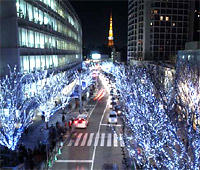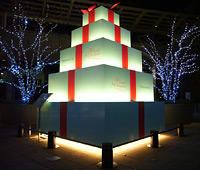The Japanese Christmas notoriously makes no apology for being a commercial, couples orientated season where KFC plays a huge role in providing a wholesome Christmas dinner. With only five days to go until the big day, a new survey by the Nikkei Net Broadband News station revealed some interesting facts about changes in how Japanese people spend their day. The survey found that 39.9% of Japanese people prefer to eat Asian food on the day—nabe, sushi, yakiniku and izakaya food topping the list. Despite Japan’s lack of ovens, however, 56% like to eat a roast chicken and 90% will definitely consume a Christmas cake.
Whilst during the bubble period, hotels were almost always completely booked out with couples eager to "have a go on Santa’s sledge," new trends see that only 0.6% of young people are willing to splurge on the usually over-priced romantic night in a hotel.
For the first time ever, Japan has seen record numbers of people wanting to spend Christmas with their family. 86% voted for family as the most important people to be with, despite the fact that Christmas day is not a national holiday in Japan so most adults will likely be with their colleagues instead.
It also seems that Japanese people have a little bit of Scrooge’s Christmas cheer in them as less than half of people give presents to close friends and family. People in their 20s are the most miserly of the lot with 43% of young people giving presents and interestingly, men that were in their 20s during the bubble period have now grown up to be 40 year old men who still have an appetite for shiny things, the survey revealed. So a quarter of men in their 40s give accessories to their loved ones, more than their 20s counterparts. However, young women are even tighter than young men, as the survey found that 36% of Office Ladies (OLs) refuse to give a present to their boyfriends.
 Roppongi Hills Christmas Lights
Roppongi Hills Christmas Lights Roppongi Hills Tiffany Christmas LightsSo it looks like a Japanese Christmas is to be spent at home, eating lots of Christmas cake and sushi and not giving presents to each other….but at least the Christmas lights look pretty!
Roppongi Hills Tiffany Christmas LightsSo it looks like a Japanese Christmas is to be spent at home, eating lots of Christmas cake and sushi and not giving presents to each other….but at least the Christmas lights look pretty!
To see the survey, click here:
http://www.nikkei.co.jp/bb/index.html
To see a KFC Christmas advert, click here:
http://www.youtube.com/watch?v=mM9IeRXxdTA
Blog:
Other posts by Anna:






Comments
Rudolf (not verified)
December 20, 2007 - 17:15
Permalink
Santa in Japan
Ms Kitanaka,
I'm curious, what percentage of Japanese children receive presents from Santa Claus? Do they have Father Christmas in Japan and if so what do they think about him? I imagine Santa would like Japan as it looks so pretty at Christmas but I heard that Japanese people don't have chimneys so how does he get in?
Thanks
Daskylinegal (not verified)
December 21, 2007 - 02:42
Permalink
New Year's
I went to live with my grandmother in Nagasaki, Japan. It was the first time I met my grandmother, she spoke no english and I only spoke english.
The year that I spent with my grandmother was nice, I enjoyed the New Year celebration, now from what I hear japan has changed to more western style life of living. Yet me, I enjoy the traditional japanese beliefs. They didn't celebrate Christmas, New Year's was the time of celebration. What happen to the traditional ways of japanese life?
Happy Holidays Everyone!
Anna
January 8, 2008 - 18:05
Permalink
How does Santa get in?
Dear Rudolf,
Regarding your question, I am unable to find any sure statistics about how many children believe in Santa. However, it appears that generally, most kids do believe in Father Christmas and according to the Japan Times, parents leave presents by the children's pillows although it really depends on the family.
As for how Santa gets in? I will forward that inquiry to Lapland!
Anna
January 8, 2008 - 18:11
Permalink
New year in Japan
Although Christmas is celebrated in Japan, it is a purely commercial affair - another reason to drink, buy presents and spend time with your loved ones.
As for the Japanese New Years, it is still a traditional event, spent at home with the family, eating Osechi ryouri (traditional bento boxes) and watching Kohaku-utagassen (a tradional new year's eve program).
I firmly believe that the Japanese new year's celebrations are here to stay. Hope this helps to answer your question.